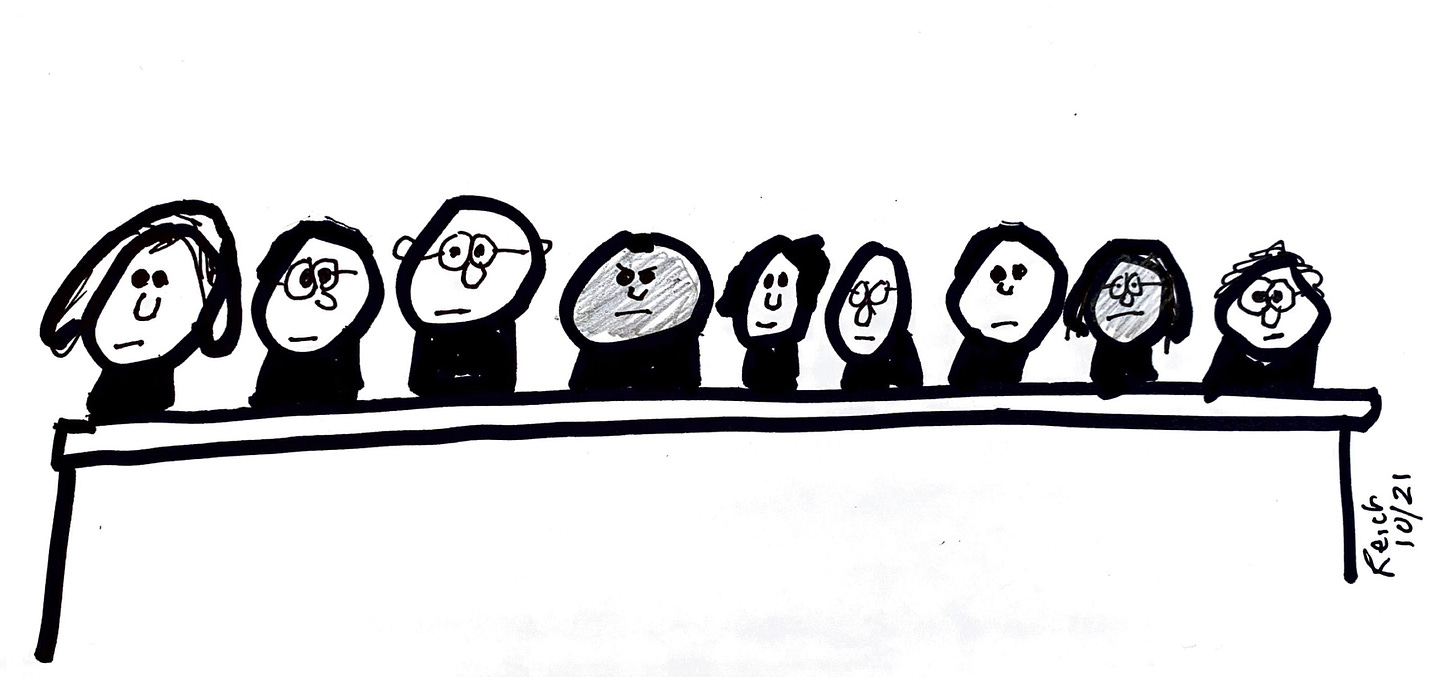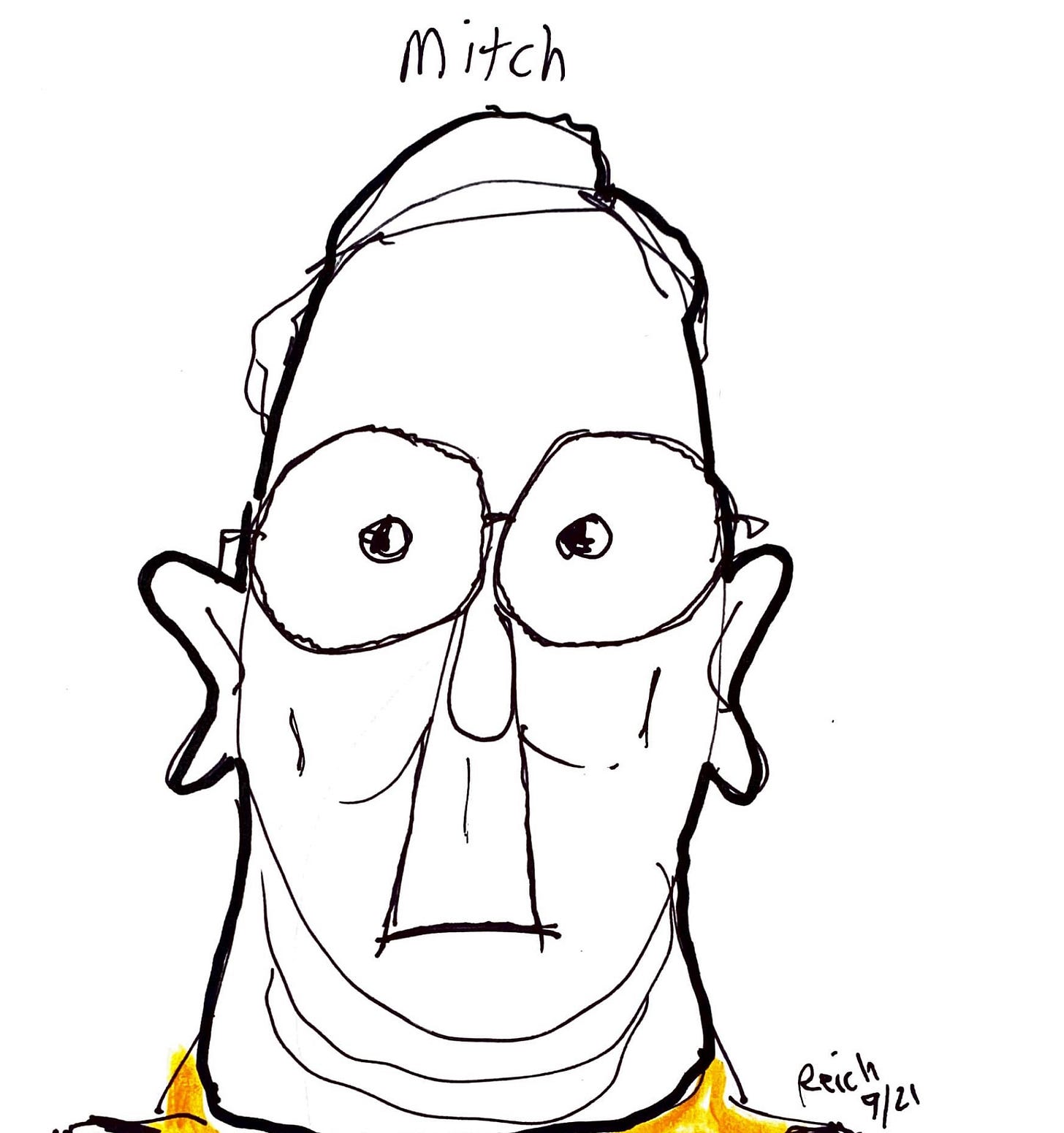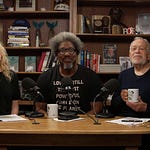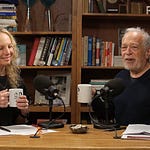Yesterday, a member of our group named Emmet Bondurant, a distinguished constitutional lawyer from Georgia, commented on this page about the filibuster:
The biggest lie of all is the Senate’s claim that it “is the greatest deliberative body in the world.” The filibuster makes the Senate the least deliberative legislative and least democratic legislative body by allowing a minority of Senators to prevent the Senate from debating, much less voting on, any legislation that is opposed by the minority party.
A decade ago, when Emmet and I served on the board of Common Cause, he brought a case before federal courts, arguing that the filibuster is unconstitutional. He didn’t get very far. (The Court of Appeals for the District of Columbia decided against Common Cause on dubious grounds, and the Supreme Court refused to hear the case.) But this was before the high court became crammed with so-called “originalists” who believe the Constitution should be interpreted to mean what the Framers thought when they drafted it.
Originalism is an absurd position, of course. American society is so different today from what it was in the eighteenth century that any attempt to apply precepts from that time to this time is doomed to failure. But why not test the sincerity of the originalists sitting on today’s Supreme Court with an issue that the Framers would find a no-brainer? All evidence suggests they would agree with Emmet that the filibuster violates the Constitution.
The Framers went to great lengths to ensure that a minority of senators could not thwart the wishes of the majority. After all, a major reason they convened the Constitutional Convention in 1787 was because the Articles of Confederation (the precursor to the Constitution) required a super-majority vote of nine of the thirteen states, making the government weak and ineffective.
This led James Madison to argue against any super-majority requirement in the Constitution the Framers were then designing, writing that otherwise “the fundamental principle of free government would be reversed,“ and “It would be no longer the majority that would rule: the power would be transferred to the minority.” And it led Alexander Hamilton to note “how much good may be prevented, and how much ill may be produced” if a minority in either house of Congress had “the power of hindering the doing what may be necessary.”
This is why the Framers required no more than a simple majority in both houses of Congress to pass legislation.
They carved out only five specific exceptions requiring a super-majority vote only in rare, high-stakes decisions: (1) impeachments, (2) expulsion of members, (3) overriding a presidential veto, (4) ratification of treaties, and (5) amendments to the Constitution. By being explicit about these five exceptions to majority rule, the Framers underscored their commitment to majority rule for the normal business of the nation. They would have rejected the filibuster, through which a minority of senators continually obstructs the majority.
So where did the filibuster come from? The Senate needed a mechanism to end debate on proposed laws and move to a vote. The Framers didn’t anticipate this problem. But in 1841, a small group of senators took advantage of this oversight to stage the first filibuster. They hoped to force their opponents to give in by prolonging debate and delaying a vote.
This was what became known as the “talking filibuster” — as popularized in Frank Capra’s other great film, “Mr. Smith Goes to Washington” (a perfect compliment to his “It’s a Wonderful Life”). But contrary to the admirable character Jimmy Stewart plays in that film, the result was hardly admirable.
After the Civil War, the filibuster was used by Southern politicians to defeat Reconstruction legislation, including bills to protect the voting rights of Black Americans. Finally, in 1917, as a result of pressure from President Woodrow Wilson and the public, the Senate adopted a procedure for limiting debate and ending filibusters with a two-thirds vote of the Senate (67 votes). In the 1970s, the Senate reduced the number of votes required to end debate down to 60, and no longer required constant talking to delay a vote. 41 votes would do it.
Throughout much of the 20th century, filibusters remained rare. (Southern senators mainly used them to block anti-lynching, fair employment, voting rights, and other critical civil rights bills.) But that changed in 2007, after Democrats took over the Senate. Senate Republicans, now in the minority, used the 60-vote requirement with unprecedented frequency.
After Barack Obama moved into the Oval Office in 2009, the Republican minority — led by Mitch McConnell — blocked virtually every significant piece of legislation. Nothing could move without 60 votes. A record 67 filibusters occurred during the first half of the 111th Congress — double the entire 20-year period between 1950 and 1969. By the time Congress adjourned in December 2010, the filibuster count had ballooned to 137. Between 2010 and 2020, there were as many cloture motions (959) as during the entire 60-year period from 1947 to 2006 (960).
Now we have a total mockery of majority rule. McConnell and his Republicans are stopping almost everything in its tracks. Just 41 Senate Republicans, representing only 21 percent of the country, are now blocking laws supported by the vast majority of Americans. This is exactly the opposite of what the Framers of the Constitution intended. To repeat: They unequivocally rejected the notion that a minority of Senators could obstruct the majority.
My humble suggestion, therefore: Senators whose votes have been blocked by the senate minority should themselves take the issue to the Supreme Court. If anyone has standing to make this argument, they surely do. If the conservative majority on the Court stands by its “originalist” principles, they’ll abolish the filibuster as violating the Constitution. (At the very least, the filibuster should not be allowed to block laws that are required to preserve democratic rules and norms. It must be lifted to enact voting rights legislation, such as the Freedom to Vote Act and the John Lewis Voting Rights Act.)
If you like my argument — which is essentially Emmet’s — please suggest it to your favorite Senator.
What do you think?












